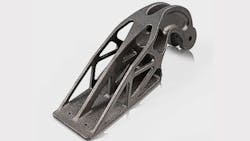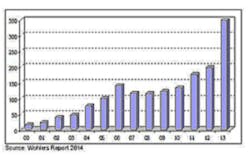Sales of additive manufacturing systems for metal parts grew by an impressive 75.8% in 2013, rising to 348 units from a total of 198 units in 2012. The result is found in the Wohlers Report 2014, the 19th annual edition of the additive manufacturing (AM, often known as 3D printing) market. The report by Wohlers Associates supplies an overview to the emerging industrial technology. Wohlers is a consulting firm that provides technical insight and strategy on trends and developments in AM, 3D printing, and rapid product development.
Wohlers Associates founder Terry Wohlers, the primary author of the report, noted that announcements during the past year of additive manufacturing programs for metal parts by Airbus and General Electric, among other companies.
In total, Wohlers Associates’ report concludes that the global market for additive manufacturing expanded by 34.9% to $3.07 billion in 2013, the highest compound annual growth rate in 17 years. It added that the CAGR has averaged 27% over the past 26 years — and averaged 32.3% over the past three years (2011-2013.)
Manufacturing metal parts represents a niche within additive manufacturing because of technological details relating to the technology (e.g., stereolithography, laser sintering, etc.), the machinery, and the alloys available for the process. Each of these areas has seen technological advances in recent months: Concept Laser AG and Renishaw introduced new metal printing capabilities; ExOne Co. and EOS GmbH have developed new nonferrous and specialty ferrous alloys for DMLS.
Also, the role of AM or 3DP has accelerated for foundries and other producers of metal parts. Research by National Additive Manufacturing Innovation Institute/America Makes, the federally sponsored research program to refine and commercialize AM techniques, has concentrated on mold and die repair using DMLS. Several commercial patternmakers have adopted AM for that purpose, and others, and now the American Foundry Society has joined a second NAMII project to make additive manufacturing more widely available to small metalcasting businesses by improving their access to the necessary equipment and developing design guidelines and process specifications.
The Wohlers Report 2014 covers all aspects of AM/3D printing, including its history, applications, processes, materials, and manufacturers. It also covers developments in R&D, investment, collaborative activities in government, academia, and industry, and it summarizes the state of the industry from around the world.
Wohlers Associates predicts that the continued expansion of the AM/3DP sector will be fueled by sales of “personal” 3D printers, now available for less than $5,000, as well as the expanded use of the technology for the production of parts in finished products, especially metal parts.
"The industry is experiencing change that we have not seen in 20+ years of tracking it," stated Tim Caffrey, Wohlers Associates senior consultant. "What's most exciting is that we have barely scratched the surface of what's possible."
About the Author
Robert Brooks
Content Director
Robert Brooks has been a business-to-business reporter, writer, editor, and columnist for more than 20 years, specializing in the primary metal and basic manufacturing industries. His work has covered a wide range of topics, including process technology, resource development, material selection, product design, workforce development, and industrial market strategies, among others.

